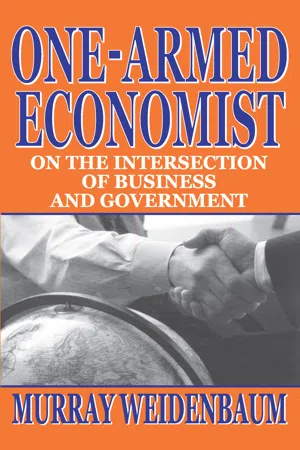Business
Government Regulations
Government regulations refer to rules and standards set by the government to control and guide the behavior of businesses. These regulations cover areas such as product safety, environmental protection, labor practices, and more. Compliance with government regulations is essential for businesses to operate legally and ethically while ensuring the well-being of society and the environment.
Written by Perlego with AI-assistance
Related key terms
4 Key excerpts on "Government Regulations"
- eBook - ePub
Solutions
Business Problem Solving
- Frank Fletcher, Eric Bolland(Authors)
- 2016(Publication Date)
- Routledge(Publisher)
CHAPTER 18 Government and Legal Issues TERESA ISAAC and BOBBY RICKSBusiness is affected by government in various ways. Governmental legislation dictates how businesses operate. Governmental agencies regulate business by promulgating and enforcing regulation. Even a lawsuit still has governmental influence where courts interpret laws and rules and court decisions are binding on future legal proceedings. It is important for businesses to know how government works as well as knowing the laws and regulations businesses must follow.This chapter will outline how government, courts and regulatory concerns affect business. This work covers key areas affecting mid-level managers. Knowledge of legal issues and court processes will help you understand why certain procedures are, and must be, followed in the work place. This chapter will not make you a lawyer, nor will it replace your legal counsel. Know your company policy regarding contacting legal counsel.What’s the role of government as it relates to my business?
Government seeks to partner with private business to ensure that goods and services are provided in a fair and safe manner. The ultimate goal is to allow all citizens equal opportunity for economic success. To assist, the government at the local, state and federal level regulates business enterprise. The first section of this chapter will help you stay informed about government regulation, explain which regulations affect your operation, show you how to challenge unfair regulation and assist you with educating government officials on how to improve regulation. Remember, where compliance with government regulation is concerned, you may think you don’t have the time to do it right, but you may have to find the time to do it over.How do I stay informed about government regulation?
Government regulation of business protects the health and safety of our citizens, enforces contractual obligations in a fair manner, eliminates discrimination and protects the environment. Government at the local, state and federal level provides information to the public about regulations, actively seeks input from the public about regulations and is accountable to the public for fair and impartial enforcement of those regulations. - eBook - ePub
One-armed Economist
On the Intersection of Business and Government
- Murray Weidenbaum(Author)
- 2017(Publication Date)
- Routledge(Publisher)
It is hard to overestimate the current rapid expansion of government involvement in business in the United States. Certainly the majority of public policy changes affecting business-government relations in recent years has been in the direction of greater governmental intervention—environmental controls, job safety inspections, equal employment opportunity enforcement, consumer product safety regulations, energy restrictions, and recording and reporting of items ranging from illnesses to foreign currency transactions. Indeed, when we attempt to look at the emerging business-government relationship from the business executive’s viewpoint, a very considerable public presence is evident in what ostensibly, or at least historically, have been private affairs.No one who operates a business today, neither the head of a large company nor the corner grocer, can do so without considering a multitude of governmental restrictions and regulations. Costs and profits can be affected as much by a bill passed in Washington as by a management decision in the front office or a customer’s decision at the checkout counter. Management decisions fundamental to the business enterprise are increasingly becoming subject to governmental influence, review, or control, decisions such as: What lines of business to go into? What products can be produced? Which investments can be financed? Under what conditions can products be produced? Where can they be made? How can they be marketed? What prices can be charged? What profit can be made?Virtually every major department of the typical industrial corporation in the United States has one or more counterparts in a federal agency that controls or strongly influences its internal decision-making. The scientists in corporate research laboratories now receive much of their guidance from lawyers in federal, state, and local regulatory agencies. The engineers in manufacturing departments must abide by standards promulgated by Labor Department authorities. Marketing divisions must follow procedures established by government administrators in product safety agencies. The location of facilities must be in conformance with a variety of environmental statutes. The activities of personnel staffs are increasingly restricted by the various executive agencies concerned with employment conditions. Finance departments often bear the brunt of the rising paperwork burden being imposed on business by government agencies who seem to assume that information is a free good—or in any event that more is always better than less. - eBook - ePub
- Prasad Modak(Author)
- 2018(Publication Date)
- CRC Press(Publisher)
4 Business Response Business operations play an important role in the sustainability of the planet whether it is a manufacturing, product or service business at a large, medium, or small scale.Businesses pollute the environment when the enforcement of environmental laws and standards set by authorities is non-existent or weak. They pollute to the point where the penalty for creating pollution becomes greater than the cost of pollution control. When the penalty is greater than abatement costs, businesses are forced to curb their emissions.In the recent decades, large and small businesses have taken initiatives, voluntarily, or to comply with regulations, to minimize their impact on the environment. There are various reasons why most businesses today want to comply:• Scarcity or non-availability of resources like fuels and industrial metals• Increasing regulations and environmental penalties• Inclination of employees, investors and consumers to be associated with sustainable brands• Risks to brand or business reputation4.1Impact of Government Policies and LegislationNational governments strengthened policies and regulations to impose limits on resource extraction and use, emissions of pollutants, and use of hazardous substances in manufactured products. The regulatory authorities followed precautionary and polluter pays principles (discussed in Chapter 2 ) while dealing with environmental issues arising from business operations.For instance, the European Parliament issued two Directives in 2003, Waste Electrical and Electronic Equipment (WEEE) and Restriction of Hazardous Substances (RoHS). WEEE Directive’s objective was to regulate WEEE management by prevention, maximizing reuse, recycling, and other forms of recovery of wastes to reduce disposal. The objective of the RoHS Directive was to reduce the hazardous material content in consumer products.1 Boxes 4.1 and 4.2 - eBook - ePub
- Martin Perry(Author)
- 2015(Publication Date)
- Business Expert Press(Publisher)
A summary of regulatory options reveals their comparative strengths and weaknesses and areas of overlap between the different ways of designing regulation rather than sharp distinctions. Chapters 3 and 4 take a closer look at the individual forms of market-based regulation, the alternative to command and control most drawn upon in response to the expanding range of environmental concerns. To commence, the chapter continues with further explanation of the need for regulation of any form. Regulation and Market Failure Regulation has been defined as: “the promulgation of rules by government accompanied by mechanisms for monitoring and enforcement, usually assumed to be performed through a specialist public agency.” 2 This is a more restricted definition than one encompassing any government actions influencing the behavior of individuals and firms. It leaves some uncertainty as to where regulation ends and broader initiatives commence but signals a focus on regulation that is enshrined within government agency programs that ultimately impose sanctions for noncompliance. This excludes self-regulation and voluntary approaches to securing change unless such actions are part of a public agency program or linked to an explicit intention to introduce mandatory regulation. 3 Regulation, even with the restricted definition adopted, is complex in that it affects business directly and indirectly. Directly, regulation mandates prohibits or rewards the behavior of the entities within its scope; indirectly, the environment in which a business operates is changed by regulation through the way it affects the behavior of customers, suppliers, employees, infrastructure providers, and government bodies
Learn about this page
Index pages curate the most relevant extracts from our library of academic textbooks. They’ve been created using an in-house natural language model (NLM), each adding context and meaning to key research topics.



